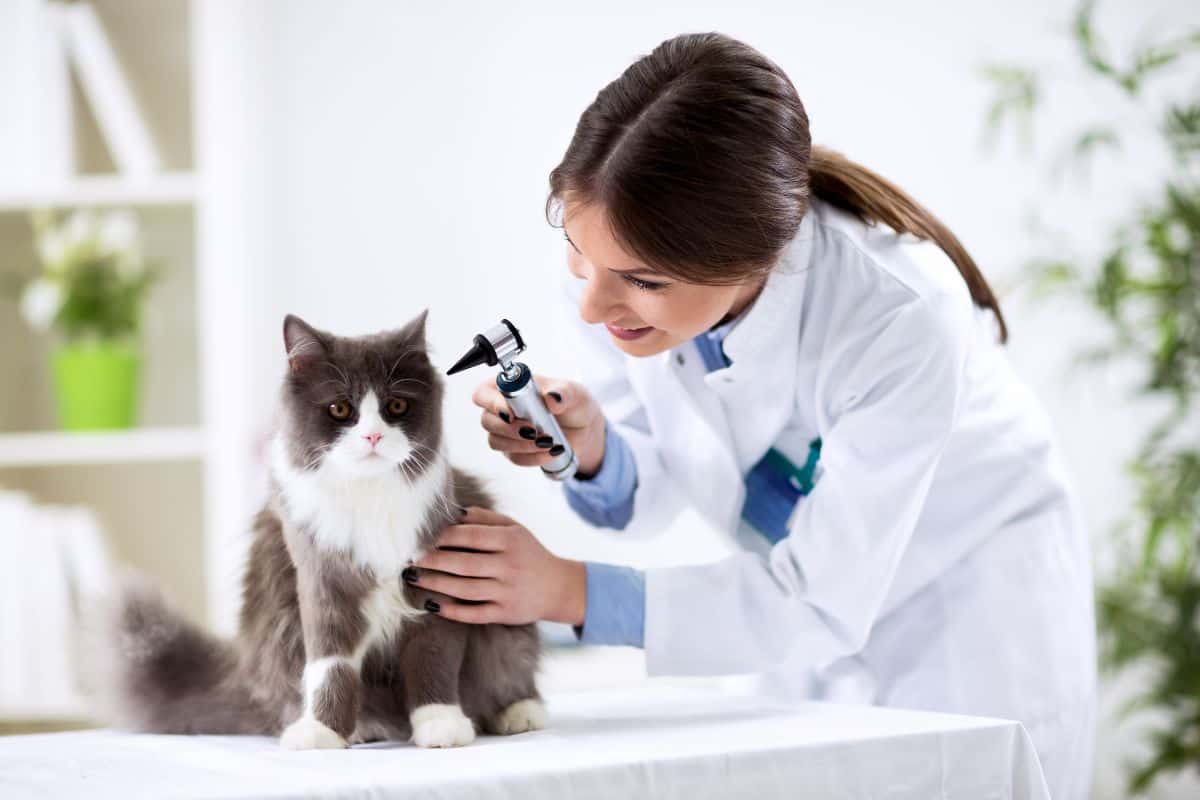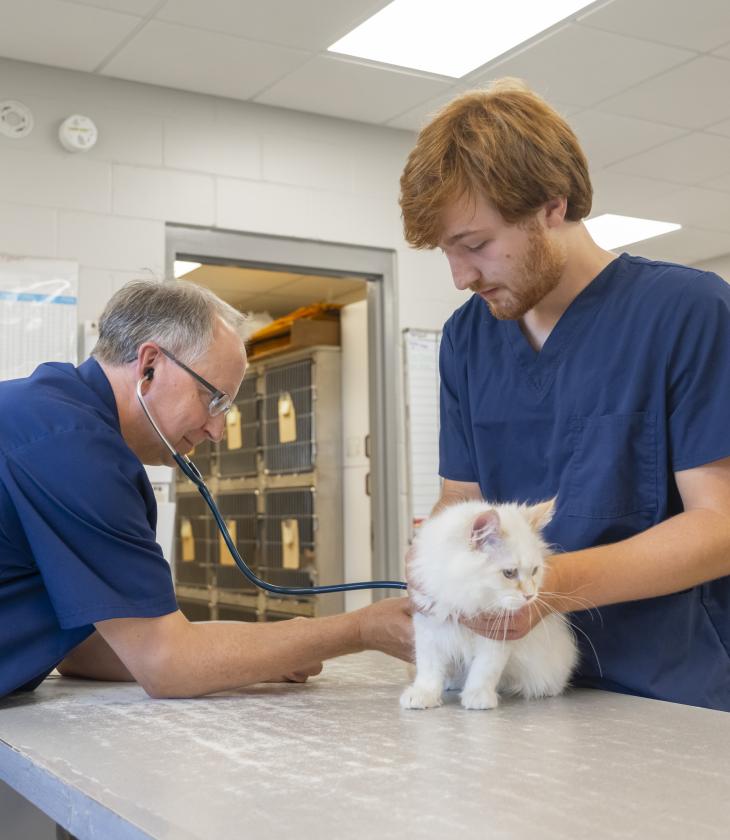What to expect before consulting a Board Certified Veterinary Oncologist
Comprehensive Guide to the Solutions Offered by a Veterinary Oncologist
Veterinary oncology encompasses a wide variety of solutions intended at treating and detecting cancer in pets. Pet Cancer Surgery. Oncologists utilize advanced diagnostic strategies and offer different therapy options customized per animal's demands. They also prioritize encouraging treatment and supply valuable resources for pet dog owners. Recognizing these solutions is vital for making educated decisions. What particular facets of vet oncology can notably affect a pet dog's treatment journey?
Comprehending Vet Oncology
Vet oncology is a specialized area focused on identifying and dealing with cancer in animals. This technique encompasses a large range of methods, from medical treatments such as radiation treatment and immunotherapy to medical treatments targeted at removing growths. Veterinary oncologists are trained to recognize the unique manifestations of cancer in different species, allowing them to tailor treatment strategies to specific patients.
Along with conventional treatments, vet oncology emphasizes encouraging treatment, which plays a crucial function in improving the lifestyle for afflicted pets. This consists of pain administration, nutritional assistance, and palliative treatment alternatives. Partnership with animal proprietors is vital, as they are indispensable to decision-making concerning their family pets' therapy paths. As research advancements, vet oncology proceeds to advance, supplying brand-new hope and improved results for animals diagnosed with cancer cells. On the whole, this area is essential for addressing the intricacies of cancer cells in companion animals.
Advanced Diagnostic Techniques
Advanced analysis methods play a vital role in vet oncology, supplying important insights into the visibility and degree of cancer cells in pets. Imaging techniques such as ultrasound, CT scans, and MRI are typically employed to visualize lumps and analyze their features. In addition, biopsy treatments are necessary for getting cells samples, enabling for definitive diagnosis and tailored therapy strategies.
Imaging Modalities Utilized
Imaging methods play an important role in the diagnosis and management of cancer cells in animals. Vet oncologists use different sophisticated imaging methods to evaluate growth dimension, presence, and transition. Radiography, or X-rays, offers a preliminary sight of bone and chest conditions, while ultrasound gives real-time imaging of soft tissues, permitting comprehensive examination of internal organs. Calculated tomography (CT) enhances visualization of complex physiological frameworks and enables 3D restorations, helping in specific lump localization. Magnetic resonance imaging (MRI) is indispensable for soft cells distinction, specifically in brain tumors. Furthermore, nuclear medication strategies such as positron exhaust tomography (PET) help determine metabolic activity within growths. Jointly, these techniques boost analysis precision, leading efficient treatment methods for oncological individuals.
Biopsy Treatments Clarified
Complying with the first analysis via imaging methods, getting a clear-cut medical diagnosis frequently requires tissue sampling via biopsy treatments. Vet oncologists make use of numerous biopsy methods based upon the growth's place and qualities. Fine needle aspiration (FNA) is a minimally invasive approach that removes cells for cytological exam, suitable for shallow masses. Core needle biopsies offer larger cells examples and serve for deeper tumors, permitting for histopathological evaluation. Surgical biopsies include excising a portion or the whole lump, assisting in complete examination. These procedures not only validate the existence of cancer yet likewise assist determine its kind and grade, guiding therapy decisions. Each biopsy approach is picked very carefully to balance analysis accuracy with patient safety and security and comfort.
Treatment Alternatives for Cancer in Pet dogs
When an animal is detected with cancer, a range of therapy choices come to be available to assist manage the illness and boost high quality of life. Vet oncologists typically suggest a multidisciplinary strategy tailored to the private pet dog's needs, which may consist of surgery, radiation therapy, immunotherapy, or alternate treatments.
Surgery is typically used to remove growths and afflicted cells, potentially causing full remission in some cases. Radiation treatment aims to target and destroy cancer cells, minimizing lump dimension and minimizing signs - Board Certified Veterinary Oncologist. Immunotherapy utilizes the family pet's body immune system to deal with cancer cells better, while alternative therapies might include acupuncture or herbal supplements to support overall health
Each treatment option carries its own advantages and threats, and vet oncologists function very closely with family pet proprietors to create a detailed plan that straightens with the pet dog's details medical diagnosis and the proprietor's desires. The utmost goal is to enhance the animal's comfort and lifestyle throughout their cancer cells trip.
Radiation treatment for Pets
Chemotherapy is a typical treatment option for pet dogs detected with cancer cells and is commonly utilized in conjunction with other therapies outlined by vet oncologists. This treatment involves the management of certain medications designed to damage and target cancer cells, consequently decreasing tumor dimension and stopping the spread of the disease. Vet oncologists tailor chemotherapy methods based on the sort of cancer cells, the animal's total health and wellness, and the desired therapy result.
Negative effects can take place, as these drugs might likewise influence important source healthy and balanced cells. Common responses include nausea or vomiting, throwing up, and temporary adjustments in hunger - Board Certified Veterinary Oncologist. Vet oncologists are furnished to manage these adverse effects successfully, making sure the pet's convenience throughout the treatment procedure. Routine surveillance with blood examinations and follow-up appointments is important to evaluate the family pet's response to radiation treatment and make required modifications. Inevitably, radiation treatment can give significant advantages, improving the quality of life for animals dealing with cancer diagnoses

Radiation Treatment in Veterinary Medication
Radiation therapy functions as a reliable treatment alternative for animals diagnosed with local tumors, using a targeted method to cancer cells monitoring. This technique makes use of high-energy radiation to damage the DNA of cancer cells, hindering their ability to multiply. It is particularly valuable for growths that are not responsive to surgical elimination or for instances where surgical treatment might not be possible as a result of the tumor's place.
Vet oncologists tailor radiation procedures based upon tumor area, type, and size, as well as the family pet's total health. Treatment can be supplied using external beam of light radiation or brachytherapy, each with distinctive benefits. Generally, several sessions are called for to maximize efficiency while lessening adverse effects.
Pets may experience short-term reactions such as skin irritation, the overall objective is to diminish tumors and minimize signs, eventually enhancing the family pet's prognosis and quality of life. Accordingly, radiation treatment plays an essential duty in thorough cancer cells treatment.
Palliative Care and Lifestyle
Palliative care in veterinary oncology concentrates on boosting the lifestyle for family pets encountering incurable health problems, making certain convenience and dignity in their final days. This specialized strategy focuses on pain management, symptom control, and psychological support. Veterinary oncologists assess each pet dog's private requirements, tailoring treatments to ease discomfort and improve total wellness.
Techniques might include administering drugs for pain relief, taking care of queasiness, and addressing various other upsetting symptoms. In addition, nutritional assistance is typically provided to keep stamina and boost hunger. The emotional element of palliative care is similarly important; developing a calm setting helps lower stress and anxiety for both pet dog and owner.
Ultimately, the objective of palliative treatment is to enable pet dogs to enjoy their continuing to be time with as much delight and dignity as feasible. By concentrating on comfort and lifestyle, veterinary oncologists play a crucial role in making certain that pets and their households browse this challenging trip with concern and understanding.
Support for Family Pet Owners Throughout Treatment

Psychological Advice for Proprietors
Charting the emotional landscape throughout an animal's cancer cells treatment can be an overwhelming experience for proprietors. The uncertainty bordering medical diagnosis and prognosis can cause sensations of sadness, vulnerability, and anxiousness. Veterinary oncologists identify the importance of emotional assistance and frequently supply guidance to assist owners navigate this tough trip. Interaction is important; going over therapy alternatives and possible outcomes can reduce some concerns. Furthermore, supplying confidence that emotional reactions are valid fosters a helpful atmosphere. Several oncology clinics may also suggest support system or counseling services tailored for pet owners, helping with shared experiences. Motivating proprietors to focus on self-care throughout this moment is essential, as their psychological health straight affects their pet's convenience and overall treatment experience.

Resources and Educational Materials
Steering through the complexities of a pet's cancer therapy can be frightening for proprietors, making access to dependable resources and instructional products important. Veterinary oncologists usually supply a range of handouts, brochures, and online products that discuss treatment alternatives, prospective adverse effects, and treatment techniques. These sources help encourage and debunk the process pet dog owners to make enlightened decisions. Additionally, lots of oncology clinics supply access to sustain groups and discussion forums where owners can attach with others dealing with comparable difficulties, cultivating a sense of area. Educational seminars and webinars carried out by veterinary experts better enhance understanding, making sure that proprietors are well-equipped to browse their pet dog's journey with cancer cells therapy with confidence and understanding.
Regularly Asked Inquiries
How Can I Prepare My Family Pet for a Vet Oncology Go To?
Preparing a family pet for a vet oncology go to includes event clinical documents, noting symptoms, and guaranteeing the family pet fits. A tranquil disposition and acquainted products can aid reduce anxiety during the appointment.
What Are the Indications My Family Pet May Have Cancer Cells?
Indications that a family pet might have cancer cells consist of inexplicable weight-loss, consistent throwing up or looseness of the bowels, uncommon swellings or swellings, sleepiness, modifications in hunger, problem breathing, and modifications in actions. Motivate vet interest is crucial.
Just How Can I Assistance My Pet Dog Psychologically Throughout Treatment?
Supporting a family pet psychologically throughout therapy entails supplying convenience, preserving routines, providing gentle love, and making sure a calm environment. Engaging in quiet play and normal friendship assists minimize tension and fosters a complacency.
Exist Alternate Therapies for Pet Dogs With Cancer cells?
Alternative treatments for family pets with cancer consist of acupuncture, natural treatments, and dietary support. These approaches might useful source match conventional therapies, promoting total wellness. Consulting with a veterinarian is essential for reliable and risk-free integration of alternate therapies.
What Prices Should I Anticipate for Vet Oncology Services?
The anticipated expenses for veterinary oncology solutions can vary substantially, typically influenced by diagnostics, therapies, and ongoing treatment. Animal proprietors ought to plan for costs varying from assessments to specialized treatments, showing the intricacy of cancer cells management.
Cooperation with family pet owners is vital, as they are integral to decision-making regarding their pet dogs' treatment paths. Each therapy option brings its very own benefits and risks, and vet oncologists function closely with family pet proprietors to design a detailed strategy that aligns with the family pet's details diagnosis and the owner's dreams. Pets may experience momentary reactions such as skin irritation, the general purpose is to shrink growths and relieve symptoms, ultimately enhancing the pet dog's prognosis and high quality of life. Assistance for pet owners during therapy is essential in steering through the emotional obstacles linked with a pet's cancer medical diagnosis. Preparing a pet dog for a vet oncology go to includes celebration medical records, noting symptoms, and making sure the pet dog is comfortable.